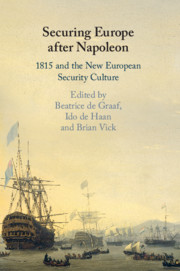Book contents
- Securing Europe after Napoleon
- Securing Europe after Napoleon
- Copyright page
- Contents
- Contributors
- Vienna 1815
- Part I Conceptualisations
- Part II Institutions and Interests
- Part III Threats
- 9 Constructing an International Conspiracy
- 10 Security and Transnational Policing of Political Subversion and International Crime in the German Confederation after 1815
- 11 The Papacy, Reform and Intervention
- 12 From Augarten to Algiers
- Part IV Agents and Practices
- Index
12 - From Augarten to Algiers
Security and ‘Piracy’ around the Congress of Vienna
from Part III - Threats
Published online by Cambridge University Press: 25 January 2019
- Securing Europe after Napoleon
- Securing Europe after Napoleon
- Copyright page
- Contents
- Contributors
- Vienna 1815
- Part I Conceptualisations
- Part II Institutions and Interests
- Part III Threats
- 9 Constructing an International Conspiracy
- 10 Security and Transnational Policing of Political Subversion and International Crime in the German Confederation after 1815
- 11 The Papacy, Reform and Intervention
- 12 From Augarten to Algiers
- Part IV Agents and Practices
- Index
Summary
A crucial moment in the establishment of a European security culture was the bombardment of Algiers in 1816 by an Anglo-Dutch fleet, after which the Regent of Algiers was forced to sign a declaration renouncing the age-old practice of keeping captured Christian sailors for ransom. Against the dominant depiction of the Anglo-Dutch cooperation as a coincidence, this chapter argues that it was a carefully planned engagement based on shared security concerns. The Vienna settlement provided the context and main incentives for the Anglo-Dutch attack on Algiers. As such, this study of the connections between the Congress and the 1816 bombardment illustrates how peace in Europe fostered cooperative security practices that could bring about violence and destruction beyond the continent.
Keywords
- Type
- Chapter
- Information
- Securing Europe after Napoleon1815 and the New European Security Culture, pp. 231 - 248Publisher: Cambridge University PressPrint publication year: 2019

